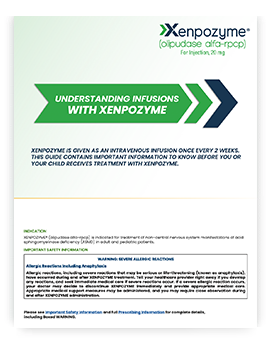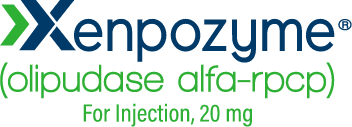This way forward to starting XENPOZYME
STARTING XENPOZYME


- XENPOZYME dosage initiation or escalation, at any time during pregnancy, is not recommended.
- If you are a female of reproductive potential, your doctor will verify your pregnancy status before starting treatment with XENPOZYME.
- Use effective contraception during treatment with XENPOZYME and for 14 days after the last dose if XENPOZYME is discontinued.
- If you are pregnant or plan to become pregnant, tell your doctor right away.
- Your doctor will order a baseline liver enzyme level measurement for you or your child within 1 month prior to the start of treatment.
- Prior to infusion, your doctor may decide to pretreat you or your child with anti-fever, anti-allergy, and/or steroid medications.
- During the dose escalation phase, your doctor will regularly order blood tests to monitor how the liver is working. If liver enzymes are elevated, the doctor may delay an infusion, repeat a dose, or lower the dose for the next infusion.
- During the maintenance phase, upon reaching the recommended maintenance dose, testing for liver enzyme levels is recommended to be continued as part of routine clinical management of ASMD.



What you should know before starting treatment
Treatment with XENPOZYME takes place in 2 phases

FIRST PHASE IS CALLED DOSE ESCALATION
You or your child will start on a low dose that will gradually increase throughout the dose escalation phase. This will last at least 14 weeks for adults and at least 16 weeks for children.*
Why dose escalation? Gradual dose escalation is essential and may reduce the risk of infusion-associated reactions and elevated liver enzyme levels when first starting treatment.
Where does dose escalation take place? The dose escalation period takes place in a clinical setting to manage for the possibility of severe reactions.
SECOND PHASE IS CALLED MAINTENANCE
After dose escalation, the target maintenance dose is 3 mg/kg.
Why ongoing maintenance? In people with ASMD, the body is unable to make enough of the ASM enzyme; therefore, it is important to keep taking XENPOZYME every 2 weeks.
Can infusions take place at home? Once you or your child starts receiving the maintenance dose, there is a potential option of receiving XENPOZYME at home if your doctor recommends it.
*In clinical trials, all but 1 of the children completed the dose escalation up to the target maintenance dose of 3 mg/kg within 22 weeks.

Find more information inside the Patient Dosing Guide
Monitoring for liver enzyme levels during infusions
What else do I need to know?

Stay on track with treatment
Make sure you set aside enough time in your calendar for regular, biweekly infusions.

Missed infusions
If you miss infusions, you may need to return to dose escalation. Dose escalation should take place in a clinical setting.
ASM=acid sphingomyelinase; ASMD=acid sphingomyelinase deficiency.
Want to receive more information on XENPOZYME?
IMPORTANT SAFETY INFORMATION AND INDICATION
|
WARNING: SEVERE ALLERGIC REACTIONS Allergic Reactions Including Anaphylaxis |
WARNINGS AND PRECAUTIONS
Allergic Reactions (Including Anaphylaxis) and Infusion-Associated Reactions (IARs)
See Boxed WARNING for more information. Your doctor may decide to give you antihistamine, anti-fever, and/or steroid medications before your infusions. Signs of allergic reactions and infusion-associated reactions (IARs) included hives, itchy skin, skin redness, rash, swelling underneath the skin, tender bumps under the skin, and localized swelling, as well as headache, vomiting, nausea, fever, and diarrhea.
Reactions may occur during and/or after the infusion. Tell your healthcare provider right away if you experience any reactions. Your healthcare provider may slow or stop the infusion or may lower the next dose.
Elevated Transaminases Levels
XENPOZYME may be associated with elevated liver enzymes (known as transaminases) within 24 to 48 hours after infusion. Your doctor should check your liver enzyme levels with a blood test:
- within one month before starting XENPOZYME;
- within 72 hours before any infusion during the dose escalation phase, or before your next scheduled XENPOZYME infusion if you missed a dose.
Based on the results of your blood tests, your doctor may make changes to your dose or infusion schedule. Upon reaching the recommended maintenance dose, your doctor may continue to monitor your liver enzyme levels.
Risk to Unborn Babies
Starting or increasing the dose of XENPOZYME is not recommended in a pregnant female as it may cause harm (birth defects) to the developing baby. If you are pregnant or plan to become pregnant, tell your doctor right away.
If you are a female of reproductive potential, your doctor will verify your pregnancy status before you start treatment with XENPOZYME. You should use effective contraception during XENPOZYME treatment and for 14 days after your last dose if XENPOZYME is discontinued.
ADVERSE REACTIONS
- Most frequently reported adverse drug reactions in adults (incidence ≥10%) were headache, cough, diarrhea, low blood pressure, and redness in the eye.
- Most frequently reported adverse drug reactions in pediatric patients (incidence ≥20%) were fever, cough, diarrhea, runny nose, abdominal pain, vomiting, headache, hives, nausea, rash, joint pain, itchy skin, fatigue, and sore throat.
INDICATION
XENPOZYME® (olipudase alfa-rpcp) is indicated for treatment of non–central nervous system manifestations of acid sphingomyelinase deficiency (ASMD) in adult and pediatric patients.
Please see full Prescribing Information, including Boxed WARNING, for complete details.
IMPORTANT SAFETY INFORMATION AND INDICATION
|
WARNING: SEVERE ALLERGIC REACTIONS Allergic Reactions Including Anaphylaxis |
WARNINGS AND PRECAUTIONS
Allergic Reactions (Including Anaphylaxis) and Infusion-Associated Reactions (IARs)
See Boxed WARNING for more information. Your doctor may decide to give you antihistamine, anti-fever, and/or steroid medications before your infusions. Signs of allergic reactions and infusion-associated reactions (IARs) included hives, itchy skin, skin redness, rash, swelling underneath the skin, tender bumps under the skin, and localized swelling, as well as headache, vomiting, nausea, fever, and diarrhea.
Reactions may occur during and/or after the infusion. Tell your healthcare provider right away if you experience any reactions. Your healthcare provider may slow or stop the infusion or may lower the next dose.
Elevated Transaminases Levels
XENPOZYME may be associated with elevated liver enzymes (known as transaminases) within 24 to 48 hours after infusion. Your doctor should check your liver enzyme levels with a blood test:
- within one month before starting XENPOZYME;
- within 72 hours before any infusion during the dose escalation phase, or before your next scheduled XENPOZYME infusion if you missed a dose.
Based on the results of your blood tests, your doctor may make changes to your dose or infusion schedule. Upon reaching the recommended maintenance dose, your doctor may continue to monitor your liver enzyme levels.
Risk to Unborn Babies
Starting or increasing the dose of XENPOZYME is not recommended in a pregnant female as it may cause harm (birth defects) to the developing baby. If you are pregnant or plan to become pregnant, tell your doctor right away.
If you are a female of reproductive potential, your doctor will verify your pregnancy status before you start treatment with XENPOZYME. You should use effective contraception during XENPOZYME treatment and for 14 days after your last dose if XENPOZYME is discontinued.
ADVERSE REACTIONS
- Most frequently reported adverse drug reactions in adults (incidence ≥10%) were headache, cough, diarrhea, low blood pressure, and redness in the eye.
- Most frequently reported adverse drug reactions in pediatric patients (incidence ≥20%) were fever, cough, diarrhea, runny nose, abdominal pain, vomiting, headache, hives, nausea, rash, joint pain, itchy skin, fatigue, and sore throat.
INDICATION
XENPOZYME® (olipudase alfa-rpcp) is indicated for treatment of non–central nervous system manifestations of acid sphingomyelinase deficiency (ASMD) in adult and pediatric patients.
Please see full Prescribing Information, including Boxed WARNING, for complete details.
